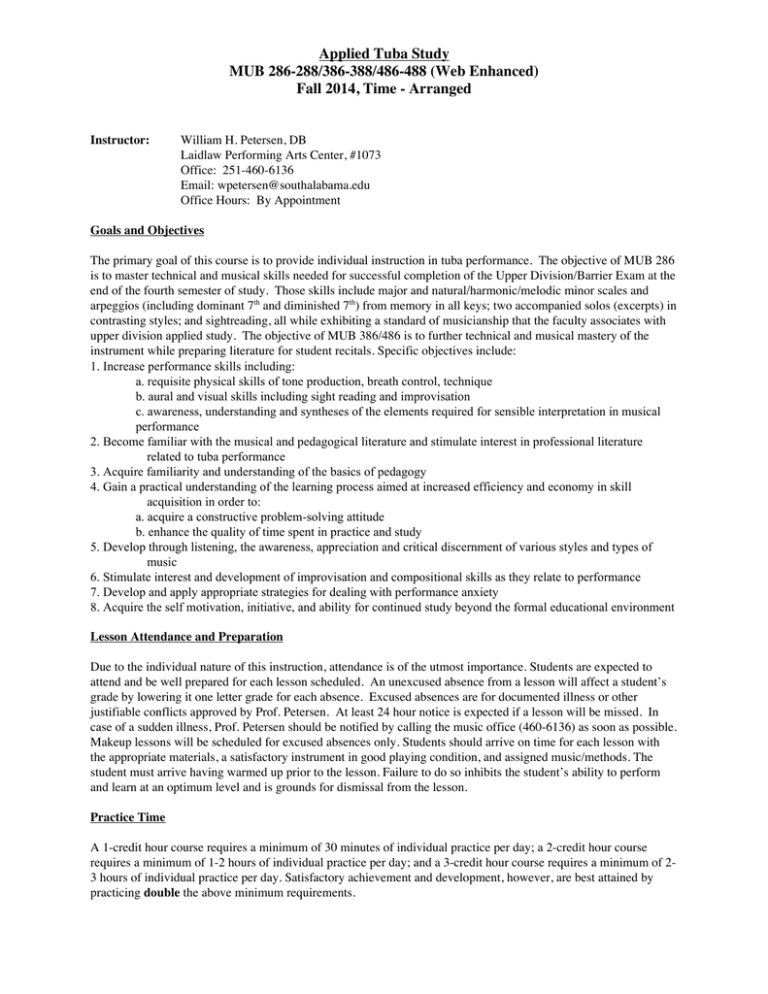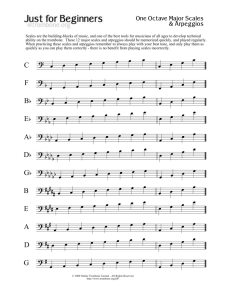Applied Tuba Study MUB 286-288/386-388/486-488 (Web Enhanced) Fall 2014, Time - Arranged
advertisement

Applied Tuba Study MUB 286-288/386-388/486-488 (Web Enhanced) Fall 2014, Time - Arranged Instructor: William H. Petersen, DB Laidlaw Performing Arts Center, #1073 Office: 251-460-6136 Email: wpetersen@southalabama.edu Office Hours: By Appointment Goals and Objectives The primary goal of this course is to provide individual instruction in tuba performance. The objective of MUB 286 is to master technical and musical skills needed for successful completion of the Upper Division/Barrier Exam at the end of the fourth semester of study. Those skills include major and natural/harmonic/melodic minor scales and arpeggios (including dominant 7th and diminished 7th) from memory in all keys; two accompanied solos (excerpts) in contrasting styles; and sightreading, all while exhibiting a standard of musicianship that the faculty associates with upper division applied study. The objective of MUB 386/486 is to further technical and musical mastery of the instrument while preparing literature for student recitals. Specific objectives include: 1. Increase performance skills including: a. requisite physical skills of tone production, breath control, technique b. aural and visual skills including sight reading and improvisation c. awareness, understanding and syntheses of the elements required for sensible interpretation in musical performance 2. Become familiar with the musical and pedagogical literature and stimulate interest in professional literature related to tuba performance 3. Acquire familiarity and understanding of the basics of pedagogy 4. Gain a practical understanding of the learning process aimed at increased efficiency and economy in skill acquisition in order to: a. acquire a constructive problem-solving attitude b. enhance the quality of time spent in practice and study 5. Develop through listening, the awareness, appreciation and critical discernment of various styles and types of music 6. Stimulate interest and development of improvisation and compositional skills as they relate to performance 7. Develop and apply appropriate strategies for dealing with performance anxiety 8. Acquire the self motivation, initiative, and ability for continued study beyond the formal educational environment Lesson Attendance and Preparation Due to the individual nature of this instruction, attendance is of the utmost importance. Students are expected to attend and be well prepared for each lesson scheduled. An unexcused absence from a lesson will affect a student’s grade by lowering it one letter grade for each absence. Excused absences are for documented illness or other justifiable conflicts approved by Prof. Petersen. At least 24 hour notice is expected if a lesson will be missed. In case of a sudden illness, Prof. Petersen should be notified by calling the music office (460-6136) as soon as possible. Makeup lessons will be scheduled for excused absences only. Students should arrive on time for each lesson with the appropriate materials, a satisfactory instrument in good playing condition, and assigned music/methods. The student must arrive having warmed up prior to the lesson. Failure to do so inhibits the student’s ability to perform and learn at an optimum level and is grounds for dismissal from the lesson. Practice Time A 1-credit hour course requires a minimum of 30 minutes of individual practice per day; a 2-credit hour course requires a minimum of 1-2 hours of individual practice per day; and a 3-credit hour course requires a minimum of 23 hours of individual practice per day. Satisfactory achievement and development, however, are best attained by practicing double the above minimum requirements. Required Materials Students are to obtain and bring all recommended music/method books needed for each lesson. The acquisition of assigned music is the responsibility of each student. It is not legal to copy copyrighted music, and it is expected that students will purchase their own method books and solos as assigned. It is highly recommended that each student own and use a metronome and tuner. A student must keep their instrument in top playing condition. Have it checked at least once a year by a good repair technician. It is also highly recommended that the student obtain insurance for their instrument (or one borrowed from the university). Your instrument may already be insured through your parent’s homeowners/renters policy, but Clarion Insurance is one well-respected and recommended company that specializes in music instrument insurance at reasonable prices. Grading Attendance Policy Due to the individual nature of this instruction, attendance is of the utmost importance. If a lesson is missed due to illness or documented emergency, notify me as soon as possible via phone, email or text, and a make-up lesson will be scheduled at mutual convenience of instructor and student. If advance notice is given for missing a lesson, a make-up can be scheduled ASAP. Any unexcused absences will not be made up. More than two absences may result in a failing grade. Due to circumstances beyond anyone’s control, the lesson schedule may need to be modified with appropriate advance notice given to the student. Grading Policy Studio Grade – 70% Each lesson will be graded, with the exception of the first lesson, which will be an assessment and planning period. Lesson grades will be averaged and will constitute 70% of the semester grade. A 2-credit course requires a minimum of 1-2 hours of practice per day; and a 3-credit course requires a minimum of 2-3 hours of practice per day. Truly satisfactory achievement and development, however, are best attained by practicing double the above minimum requirements. Grades are recorded for every lesson, and each student is always welcome to check on his or her grade at any time during the semester. Grades are based on performance, progress/improvement, effort, and attitude. As these terms can be rather subjective, it is in the student’s best interest to know his or her grades as the semester progresses. All Grades will be posted to the course’s Sakai gradebook. Any student who is clearly unprepared for his or her lesson may be dismissed from his/her lesson, and that lesson will be graded as failing. A = Exceptional progress, always prepared B = Good progress, usually well prepared C = Some progress, inconsistent preparation D = Little progress, rarely prepared F = No progress, never prepared Further definition of grading (as it applies to lessons): A = A thoroughly prepared lesson on the assigned material, with evidence of extensive practice. Assigned lesson material is played near-perfect and performed musically. “Near-perfect” means that the student knows the music sufficiently well that notes and rhythms are not a problem and that the student has made a thoughtful effort to perform the piece musically. B = An adequately prepared lesson, with evidence of substantial practice on the assigned material. Lesson material is played well, with minor flaws, but lacks polish. C = A somewhat prepared lesson, with evidence of moderate practice on the assigned material. Lesson material is played moderately well, but with consistent note and rhythm problems. D = A lesson not well prepared, with evidence that some practice has taken place on the assigned material. Lesson material is played rather poorly. F = A lesson not prepared at all. Evidence that little or no practice has taken place on the assigned material. Applied Music Exams (Juries) – 30% Students enrolled at the 200 level or higher for two credit hours will be required to perform an applied music examination (jury) before the instrumental faculty at the end of the semester. The purpose of this exam is to monitor the progress of the student in their instrumental study. There will be two separate juries, the Technical Jury and the Studio (Artistic) Jury. Expectations will vary according to the level of the student. You will be assisted in your lessons in the preparation of appropriate material for this exam. Studio Jury – 20% - End of Semester (TBA) The student will perform a solo or concert etude with accompaniment as appropriate to the repertoire. In addition, the student will be asked to sightread. The performance will be graded on both artistic and technical merit by the members of the instrumental faculty. Technical Jury – 10% The Technical Jury will consist of scales and arpeggios in all keys, according to the following schedule. All scales and arpeggios will be two octaves, three where possible. • • • • • • Semester 1 – all major scales, arpeggios and thirds; two-octave chromatic scale Semester 2 – all natural minor scales, minor arpeggios, natural minors in 3rds; two-octave chromatic scale Semester 3 – all harmonic minor scales, arpeggios, 3rds, and dominant 7th arpeggios; two-octave chromatic scale Semester 4 – all melodic minor scales and diminished 7th arpeggios; melodic minor scales in thirds; two-octave chromatic scale plus ALL PREVIOUS REQUIREMENTS Semester 5 – all whole tone scales (2), diminished scales-WH or HW (3), Blues scales (12), and augmented arpeggios (4); two-octave chromatic scale Semester 6 – all Dorian and Mixolydian scales and minor 7th arpeggios; two-octave chromatic scale Tempo: Play eighth notes at quarter note = 132. All Technical Juries, with the exception of Semester 4, the Upper-Division/Barrier Exam, will be performed via video, according to the following instructions. The Upper-Division/Barrier Technical Exam will be performed live before a panel of faculty. Video Instructions • Each student must create an unedited video of his/her required scales & arpeggios. • The student may use a metronome during the video to play the scales and arpeggios at the assigned tempo. • Any pause between consecutive scales must be no more than six (6) seconds. • All videos must be no longer than eight (8) minutes. Any video that exceeds this limit will be immediately rejected and given a failing grade. • Students must perform all keys & patterns in either circle or chromatic order. • All patterns must be performed from memory. The video picture should display the entire body of the player, showing clearly that no music is being used. • A student may record his or her video as many times as necessary to produce an acceptable result. However, no editing within a video will be allowed. • The video must be uploaded to the student’s YouTube account, after which the student must email the web link URL for the video to his or her applied professor by 5:00 pm on Friday, December 7. • The members of the wind and percussion faculty will then observe and grade the technique jury video. Grading Scale >90% >80% >70% >60% <59 A B C D F Sakai Learning Environment Sakai will be utilized in a variety of ways in this course. You will have access to your syllabus and current grades through Sakai as well as electronic media (audio/visual recordings), studio calendar, and other resources that will be utilized in your applied study. Recital Class Performance Performing before a live audience is an important and valuable learning experience, and each student will do so at least once per semester. It is also recommended that one take advantage of the Recital Class performing opportunities and perform more often than the minimum requirement. Tuba Masterclass Though not required as part of this course, students within the tuba/euphonium studio are strongly encouraged to particpate in their instrument’s weekly one-hour masterclass. This one hour class will be scheduled during the first week of the semester and focus on performance of solo literature, concert wind band and orchestral excerpts, audition preparation, instrument pedagogy, and other applicable subject matter. Concert Attendance All tuba students will be expected to attend all on-campus recitals and special events that feature other low brass players in recitals and masterclasses. It is also recommended that students make every effort to attend all recitals and events that feature brass instruments, as well as other concerts and masterclasses outside the brass area. Upper Division Study and the Barrier Exam At the end of the second year of study at the 200 level, students will be required to pass the Upper Division Barrier audition for the faculty jury in order to proceed to 300-level applied study. Students are expected to do the following on this Barrier Exam: 1. Perform all major, natural, harmonic, and melodic minor scales; major, minor, dominant 7th, and diminished 7th arpeggios; from memory. 2. Present a list of etudes and solo repertoire studied that semester, any of which the committee may ask to hear. 3. Perform two solos (or excerpts) in contrasting styles, at least one of which should be accompanied. 4. Sight-read a selection chosen by the committee. 5. Exhibit a standard of musicianship that the faculty associates with upper division applied study. Students with Disabilities In accordance with the Americans with Disabilities Act, students with bona fide disabilities will be afforded reasonable accommodation. The Office of Special Student Services will certify a disability and advise faculty members of reasonable accommodations. If you have a specific disability that qualifies you for academic accommodations, please notify me and provide certification from the Special Student Services (Office of Special Students Services). The Office of Special Students Services is located at 5828 Old Shell Rd., Phone 460-7212. Changes in Course Requirements Students will be given adequate notification in writing prior to any changes in course requirements and/or expectations. Academic Disruption Policy The University of South Alabama respects the right of instructors to teach and students to learn. Maintenance of these rights requires an academic environment that does not impede their exercise. Faculty and staff have the responsibility: -to establish and implement academic standards; -to establish and enforce reasonable behavior standards in each academic setting; -to document and report incidents of academic disruption; -to refer for disciplinary action those students whose behavior may be judged to be disruptive under the Code of Student Conduct. Disruption refers to behavior a reasonable person would view as substantially or repeatedly interfering with the conduct of an activity. Student Academic Conduct Policy (Policy effective for alleged misconduct occurring after January 1, 2010.) As a community of students and scholars, the University strives to maintain the highest standards of academic integrity. All members of the community are expected to exhibit honesty and competence in academic work. This responsibility can be met only through earnest and continuing effort on the part of all students and faculty. Any dishonesty related to academic work or records constitutes academic misconduct including, but not limited to, activities such as giving or receiving unauthorized aid in tests and examinations, improperly obtaining a copy of an examination, plagiarism, misrepresentation of information, altering transcripts or university records. Academic misconduct is incompatible with the standards of the academic community. Such acts are viewed as moral and intellectual offenses and are subject to investigation and disciplinary action through appropriate University procedures. Penalties may range from the loss of credit for a particular assignment to dismissal from the University. Degree revocation may be warranted in cases involving academic misconduct by former students while they were students at USA. Note that dismissal from any University of South Alabama college or school for reasons of academic misconduct will also result in permanent dismissal from the University. Faculty, students, and staff are responsible for acquainting themselves with, adhering to, and promoting policies governing academic conduct. JagAlert JagAlert is a program intended to help students be successful in 100-200 level courses. If you are not doing well, you will receive an email instructing you to see your professor, along with instructions to access an online tutorial intended to help with common problems affecting academic performance. Watch for this email during week eight of this semester. Online Writing Support • The University of South Alabama provides online writing tutoring services through SMARTHINKING, an online tutoring service. SMARTHINKING is available at http://services.smarthinking.com. Students may enter the site by logging on with their Jag number and using the last four digits of the social security number as the password. For log-on problems, technical questions and/or on-campus writing assistance, contact the USA Writing Center at 251-460-6480 or e-mail csaint-paul@usouthal.edu. • Information about the University Writing Center and Online Writing Lab can be found online at http://www.southalabama.edu/univlib/instruction/antiplagiarism/writinghelp.html. Selected Methods and Etudes for Tuba Method and Etude Books Arban (Young and Jacobs) Bell Blazhevich Bordogni Bordogni/Rochut/ed Raph Concone/Jacobs Kopprasch/Young Kopprasch/Young Leonard, Hal Matteson Pilafian/Sheridan Pilafian/Sheridan Snedecor Tyrell Vasilev Complete Method for Tuba Foundation for Tuba Playing 70 Studies for Bb Tuba Vol. 1 and 2 43 Bel Canto Studies Melodiuos Etudes for Trombone Vol. 1 Concone Solefegi for Tuba (only available through Encore Music Publishers www.encoremupub.com) 60 Studies for BBb Tuba, Op. 6 60 Studies for Tuba, Op. 5 (only available through Encore Music Publishers www.encoremupub.com) Hal Leonard Advanced Band Method: Basses Flexibility and Improvasation Patterns The Brass Gym (Tuba) The Breathing Gym (Book S1, DVD S2, Daily Workout DVD S3) Low Etudes for Tuba 40 Advanced Studies for Tuba 24 Melodious Etudes Encore Carl Fischer Leduc/Robert King Leduc/Robert King Carl Fischer Encore Encore Encore Music Publishers Hal Leonard Jamey Abersold Focus on Music Focus on Music Leduc/Robert King Boosey & Hawkes Leduc/Robert King Online Music Lists for USA Tuba Studio: Members of the tuba studio can access the vast majority of the above selected methods as well as suggested solo repertoire at http://www.jwpepper.com/sheet-music/musiclist.jsp. Students can purchase the selected materials from any source; this list is solely for informational purposes only and students are NOT required to purchase music through JW Pepper. Etudes and Methods: Search for “USA Tuba Req Etudes” - password is “usatuba” Solo Repertoire: Search for “USA Tuba Solos” – password is “usatuba” ITEA Membership Students in the Tuba/Euphonium Studio are expected, as aspiring professional musicians and music educators, to take an active interest their applied performance field. As such, students are expected to join the International Tuba and Euphonium Association. Regular membership for students is $36.00 per year and E-Membership is $28.00 (EMemberships do not receive a printed copy of the ITEA Journal but do receive an electronic copy).



